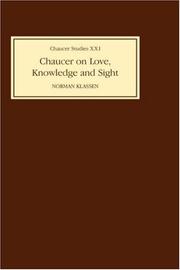| Listing 1 - 2 of 2 |
Sort by
|

ISBN: 085991464X 1846153077 9781846153075 Year: 1995 Publisher: Cambridge Brewer
Abstract | Keywords | Export | Availability | Bookmark
 Loading...
Loading...Choose an application
- Reference Manager
- EndNote
- RefWorks (Direct export to RefWorks)
In this study, Norman Klassen shows how Chaucer explores the complexity of the relationship between love and knowledge through recourse to the motif of sight. The convention of love at first sight involves love, knowledge, and sight, but insists that the claims of love and the realm of the rational are in strict opposition. In the metaphysical tradition, however, the relationship between love, knowledge and sight is more complex, manifesting both qualities of opposition and of symbiosis, similar to that found in late medieval natural philosophy. The author argues that Chaucer is unorthodox in exploiting the possibilities for using sight both to express emotional experience and to accentuate rationality at the same time. The conventional opposition of love and knowledge in the phenomenon of love at first sight gives way in Chaucer's development of love, knowledge, and sight to a symbiosis in his love poetry. The complexity of this relationship draws attention to his own role as artificer, as one who in the process of articulating the effects of love at first sight cannot help but bring together love and knowledge in ways not anticipated by the conventions of love poetry.'NORMAN KLASSEN'is a Social Sciences and Humanities Research Council of Canada postdoctorial fellow at the Centre for Medieval Studies and the Department of English Language and Literature at the University of Minnesota.
Chaucer, Geoffrey --- Knowledge, Theory of, in literature. --- Philosophy, Medieval, in literature. --- Vision in literature. --- Love in literature. --- Chaucer, Geoffrey, --- Philosophy. --- Chaucer, Jeffrey, --- Chʻiao-sou, Chieh-fu-lei, --- Chieh-fu-lei Chʻiao-sou, --- Choser, Dzheffri, --- Choser, Zheoffreĭ, --- Cosvr, Jvoffrvi, --- Tishūsar, Zhiyūfrī, --- Chaucer. --- Emotional Experience. --- Knowledge. --- Love Poetry. --- Love. --- Medieval Natural Philosophy. --- Metaphysical Tradition. --- Rationality. --- Sight.
Book
ISBN: 9780520256958 0520256956 9780520256965 0520256964 0520943910 9786612772627 1282772627 9780520943919 Year: 2009 Publisher: Berkeley Los Angeles London University of California Press
Abstract | Keywords | Export | Availability | Bookmark
 Loading...
Loading...Choose an application
- Reference Manager
- EndNote
- RefWorks (Direct export to RefWorks)
Everyone knows the thrill of being transported by a film, but what is it that makes movie watching such a compelling emotional experience? In Moving Viewers, Carl Plantinga explores this question and the implications of its answer for aesthetics, the psychology of spectatorship, and the place of movies in culture. Through an in-depth discussion of mainstream Hollywood films, Plantinga investigates what he terms "the paradox of negative emotion" and the function of mainstream narratives as ritualistic fantasies. He describes the sensual nature of the movies and shows how film emotions are often elicited for rhetorical purposes. He uses cognitive science and philosophical aesthetics to demonstrate why cinema may deliver a similar emotional charge for diverse audiences.
Motion picture audiences --- Motion pictures --- Psychology. --- Film --- United States --- 82:791.43 --- 82:791.43 Literatuur en film --- Literatuur en film --- Cinéma --- Publics --- Psychologie --- Psychology --- american film. --- audience theory. --- cinema and film. --- cognitive science. --- cultural studies. --- desires. --- emotional experience. --- film criticism. --- film studies. --- film. --- hollywood films. --- mainstream narratives. --- media studies. --- movie criticism. --- movie studies. --- movie watching. --- movies and emotions. --- movies. --- moving viewers. --- negative emotions. --- philosophical aesthetics. --- pleasures. --- psychology of spectatorship. --- ritualistic fantasy. --- sensual films. --- spectators. --- sympathetic narratives. --- synesthesia. --- the paradox of negative emotion. --- watching a movie. --- United States of America
| Listing 1 - 2 of 2 |
Sort by
|

 Search
Search Feedback
Feedback About UniCat
About UniCat  Help
Help News
News